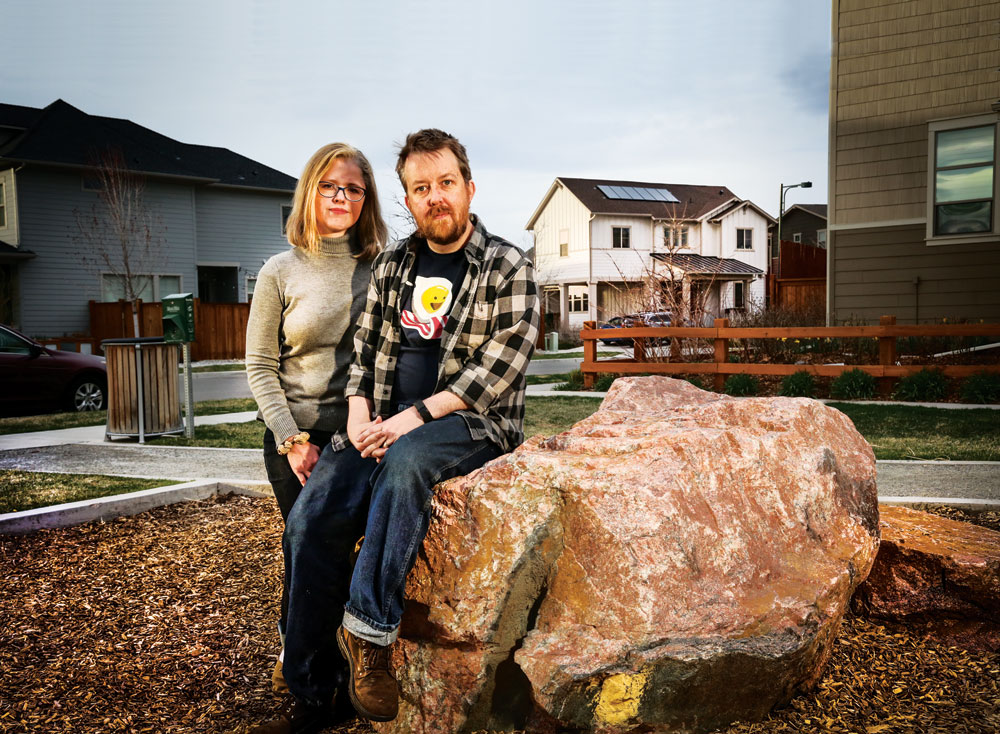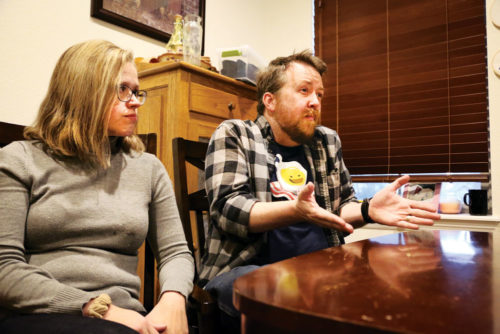
Monica and Devon Jones are pictured in the park where their four-year-old daughter was playing as they watched her from their home, the white house shown behind them.
How much freedom can parents legally give a 4-year-old?
Parents in Stapleton do it all the time. They let their kids play in the pocket parks, walk down the street to a neighbor’s house, bike to school. The community was intentionally designed with small back yards and lots of common spaces, inviting children to roam the neighborhoods on their own.
But for Monica and Devon Jones, their daughter’s independence led to a criminal investigation that took months to resolve. And now they’re on a mission to change Colorado law.
When he heard a knock on the door early September evening, Devon Jones thought it might be the girl from down the street inviting his daughter to play. But instead, two caseworkers from Denver’s Department of Health Services (DHS) Child Protective Services (CPS) were on the porch, investigating a report of child endangerment from two weeks before.
On August 21, 2017, Monica Jones was with her four-and-a-half year old daughter, who wanted to play in the small park across the street. The Joneses had been working with her, teaching her not to cross their quiet street if she saw a moving car, and their daughter loved her independence. So Monica gave permission.
Monica watched for a while from the porch and then from many windows inside their house as she played. The park was crowded that day, full of neighbors out to witness the solar eclipse. “You can see kids play through the window,” said Monica. “This is why we moved here—because we had such close access to all these tiny little parks that made this neighborhood feel like family…”
But to one nanny, perhaps unaccustomed to the neighborhood ways, the child playing on her own at the park looked wrong. She reported to CPS that a child under age three was in danger.
After Devon Jones let the caseworkers in, they proceeded to interview him about his parenting philosophy and practices. According to Devon, they chided him for allowing his daughter to play unattended and questioned his justification that it helped build independence. They returned later to interview Monica, quizzing her on what had happened that day, on how she disciplined their infant daughter, on how she and Devon argued.
The Joneses said the caseworkers mentioned multiple neighbors’ had complained. “The implication had been that we’d violated the social norms,” said Monica. They would later learn it was only the single complaint, from a nanny with no connection to Stapleton.
But at the end of the visit with Monica, the CPS social worker “substantiated” two counts under administrative law: “Environment Injurious” (the park) and “Insufficient Supervision” (the parents), according to a letter by Monica posted on a blog. Within the administrative law system that governs DHS cases, substantiation is much like proving guilt, but without the due process, according to Devon.
“The CPS worker comes here, interviews you, makes the decision… and then your only recourse is appeal,” said Devon. “There is no trial, there’s nothing.”

“I can’t imagine anyone could look at what happened to us and think that the best solution for our children, that they are safest, is if we are in jail, and they lose their home and everything they’ve come to know, and…have to live with their grandparents,” said Stapleton resident Monica Jones, with husband Devon Jones.
Julie A. Smith, DHS marketing & communications director, clarified the process in an email: “At the conclusion of the assessment, the caseworker must determine whether the preponderance of the evidence supports a finding that an incident of abuse or neglect as defined in rule or law occurred. Such a finding is in no way an overall judgement of parenting, or current condition of the child.” Smith emphasized that the DHS’s main goal is “safe children.”
According to the Joneses, the decision meant that they would be banned from ever working with children where background checks were needed, such as volunteering in the daughters’ classrooms, something both parents had hoped to do one day.
Although unable to comment on the specifics of the Jones case, Smith noted in her email, “What is important to understand is that decisions regarding the safety of a child and family are not made unilaterally by DHS social caseworkers. Our social caseworkers report up to supervisors, managers and specialists within and outside of DHS who review cases and advise us on our work.”
As the Joneses sought advice from a lawyer who specialized in administrative law, the DHS pursued further action against them, bringing in the Denver Police Department and the City Attorney’s office. “Now when they found out we had a lawyer, they were like, ‘Jig is up. We’re just going to file charges,’” said Devon. They were brought up on municipal charges that carried potential sentences of a year in jail and $1,000 fine.
Contemplating a year in jail terrified the Joneses, but on the advice of their attorneys, they turned down an offer from the prosecutor of a year’s probation and parenting classes. With no criminal records, and no injuries to their child, they decided to fight the charges. And to set the record straight. Not only did they disagree that they had endangered their child, but details about the age of their daughter and the proximity of their home were misrepresented, they said, making the incident look worse.
In the end, Devon’s charges were dismissed since he had been at work on the day of the incident, but Monica went to trial. The nanny who’d made the complaint allegedly was out of the country and unable to return in time to ensure Monica a speedy trial. Thus, her charges were also dismissed on March 22, 2018. The day after Monica’s dismissal, the state overturned the original DHS decision.
But the experience has left its mark in other ways. Their daughter has been afraid to walk two doors down to visit her neighbor friend, because the CPS worker had suggested “a car could jump the curb” and hit her, according to the Joneses. They are working through new fears with her, and are exceedingly cautious about leaving her unsupervised, although it goes against their parenting beliefs.
In the bigger picture, the Joneses are looking into changing Colorado law. “We would love to see a free range parenting law passed here in Colorado like the one in Utah,” said Monica. “That would be the best outcome of all of this.”
The Utah “Free Range” parenting law changes the definition of neglect to allow for different parenting styles. “You can’t use a kid playing on their own or a kid walking from school to home or anything where harm is not actually taking place to them,” explained Devon. “Being unsupervised can’t be something you can be criminally prosecuted for…” The Joneses fully understand that some situations merit intervention, but would like to see better guidelines in place in Colorado.
The Joneses are talking to people who have experience in bringing about changes to the law, contacting local and state representatives and creating a community of like-minded parents to work together on the process.
You can find their site on Facebook, called Free Range Kids Colorado, or send an email to freerangekidscolorado@gmail.com to learn more.



Completely agree with the parents! Kudos to them for forgoing the social “norm” and being an advocate to teach their daughter independence. That’s part of our society’s problem today – the government tells us how we should parent…last I checked most of us (I’m 34, so speaking from the 80’s and 90’s here) played outside ALL DAY LONG “unsupervised” and are all kicking just fine. What really sucks? Parents all over the US, have to watch their backs parenting now because of instances like this. Spank your child? CPS. Child plays outside unsupervised? CPS. Rides their bike down the street? CPS. Helicopter parenting has become the norm because we (parents) have been forced into this by all of this overprotective bullcrap from the government instead of letting parents do their job – raise their kids.
I agree with the Jones’, and this never should have happened to them. They should file a suit against DHS for this, and for making the situation seem worse than it was. How has helicopter parenting and being overly cautious with your kids become the “accepted” norm? This actually hurts kids more than it helps them. Kids need to learn how to deal with peers and the real world without their parents being right there all the time. Let’s go back to the old days, when kids were given more freedom and the government stayed out of your business when it comes to parenting (unless of course if obvious child abuse is occurring). I hope more people fight to fix this problem, and it gets more media attention.
This is a nationwide issue- more at http://www.freerangekids.com/category/child-protective-services/#mc_signup